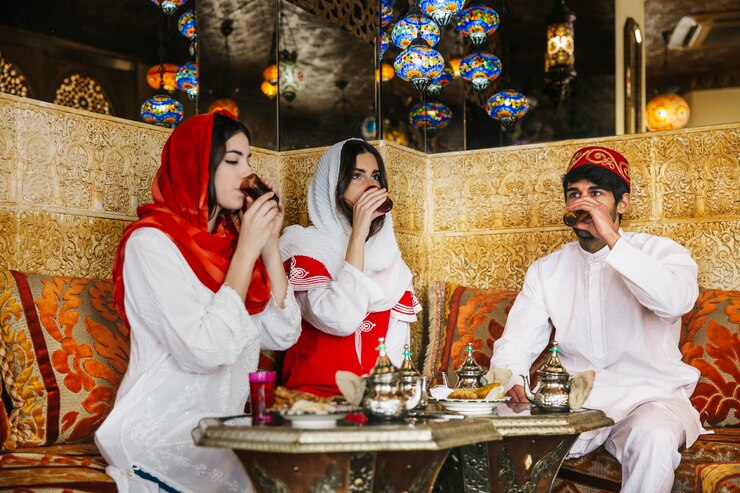The Significance of Ramadan in Islam: A Profound Spiritual Journey
March 15, 2024 2025-08-13 11:17The Significance of Ramadan in Islam: A Profound Spiritual Journey
The Significance of Ramadan in Islam: A Profound Spiritual Journey
Ramadan, the ninth month of the Islamic lunar calendar, holds immense significance for Muslims worldwide. It is not merely a time of physical fasting but a transformative journey that encompasses spiritual growth, self-reflection, and devotion. Let us delve deeper into the multifaceted importance of Ramadan.
1.The Night of Decree: A Night of Spiritual Power
The Hidden Treasure of Ramadan
Laylat al-Qadr, also known as the Night of Power, is a hidden treasure within the last ten nights of Ramadan. It is a night that surpasses a thousand months in blessings and spiritual significance. The Quran itself emphasizes its extraordinary status:
“Indeed, We sent the Qur’an down during the Night of Decree. And what can make you know what is the Night of Decree? The Night of Decree is better than a thousand months.” (Surah Al-Qadr, 97:1-3)
The Mystery of Laylat al-Qadr
The exact date of Laylat al-Qadr remains unknown, deliberately veiled in mystery. However, Muslims believe that it falls on one of the odd-numbered nights—either the 21st, 23rd, 25th, 27th, or 29th night of Ramadan. Some even add the 19th night to this series. The uncertainty surrounding its precise timing encourages believers to seek it diligently throughout the last ten nights.
A Night of Blessings and Mercy
On Laylat al-Qadr, angels descend to the earthly realm, carrying divine blessings and mercy. It is a night when sincere prayers are answered, sins are forgiven, and hearts are purified. Muslims engage in various acts of worship:
- Tahajjud Prayers: Devotees wake up during the late hours of the night to offer extra prayers (Tahajjud). These intimate conversations with Allah allow believers to seek forgiveness, guidance, and blessings.
- Reading the Quran: The recitation of the Quran during Laylat al-Qadr holds immense reward. Muslims immerse themselves in the sacred text, reflecting on its verses and seeking divine illumination.
- Making Dua (Supplication): The night is an opportune time to pour out one’s heart in supplication. Believers ask for forgiveness, guidance, and blessings for themselves and their loved ones.
- Observing Iʿtikāf: Some individuals retreat to the mosque during the last ten days of Ramadan, dedicating themselves to worship and seclusion. This practice intensifies during Laylat al-Qadr.
- Giving Sadaqah (Charity): Acts of charity and kindness are highly encouraged. Muslims share their blessings with others, recognizing the importance of compassion and generosity.
The Spiritual Quest
Laylat al-Qadr is not merely a historical event; it is a living reality. Believers strive to connect with Allah, seeking His favor and guidance. The night symbolizes hope, renewal, and transformation. It reminds us that our destinies are written, and our sincere efforts matter.
As the moon waxes and wanes, as the stars twinkle in the night sky, Muslims across the globe engage in this spiritual quest. They yearn for Laylat al-Qadr, knowing that within its darkness lies a luminous promise—a chance to draw closer to Allah and emerge spiritually rejuvenated.
May we all find Laylat al-Qadr, embrace its blessings, and experience the divine mercy that descends upon us during this sacred night.
2.Human Nature in the Qur’an: A Divine Perspective
The Qur’an serves as a comprehensive guide for humanity, addressing various aspects of life, including our nature, purpose, and relationship with the Divine. Here are key insights from the Qur’an regarding human nature:
1. Creation and Status of Humankind
- Apex of God’s Creation: In Muslim reflection inspired by the Qur’an, human beings are considered the apex of God’s creation (ashraf al-makhlūqāt). Although this specific term is not directly used in the Qur’an, the scripture elevates the status of the Children of Adam. We are congenitally created in the best form, reflecting God’s wisdom and design.
- Ambivalence of Our Nature: However, the Qur’an also acknowledges the ambivalence of our nature. While we are created in the best form, we are also prone to degradation and moral decline (Qur’an 95:4-5). This dual nature—capable of both nobility and baseness—defines our existential reality.
2. Purpose of Creating Human Beings
- Guidance and Criterion: The Qur’an explicitly states that it was revealed during the month of Ramadan as a guidance for humanity. It provides clear proofs of guidance and serves as a criterion for distinguishing right from wrong. Our purpose lies in seeking this guidance and aligning our lives with its principles.
3. Seeking Forgiveness and Spiritual Quest
- Seeking Forgiveness: The Qur’an encourages seeking forgiveness from Allah. As imperfect beings, we are prone to making mistakes and committing sins. Seeking forgiveness demonstrates humility, remorse, and a desire for spiritual purification.
- Spiritual Quest: The Qur’an invites us to look inward—to explore our spiritual nature. Who are we by nature? What is our purpose? Through sincere reflection and seeking Allah’s mercy, we embark on a spiritual quest to understand our essence and fulfill our potential.
In summary, the Qur’an provides a holistic perspective on human nature. It recognizes our nobility, acknowledges our vulnerabilities, and emphasizes seeking divine guidance. As we navigate life, understanding our nature from this divine lens helps us strive for moral excellence and align our actions with God’s mercy and grace.
Fasting: A Profound Act of Worship
Beyond Physical Abstinence
Fasting during Ramadan (Sawm) goes beyond merely abstaining from food and drink. It is a central practice that encompasses self-discipline, empathy, and gratitude. Here’s how fasting serves as a profound act of worship:
- Purification of the Soul: Fasting allows believers to cleanse their hearts and minds. By abstaining from physical needs, individuals engage in self-reflection, repentance, and seeking forgiveness. It’s a time to purify the inner self and draw closer to Allah.
- Heightened Awareness: Depriving oneself of food and drink sharpens spiritual awareness. As the body adjusts to fasting, the mind becomes more attuned to its surroundings. Muslims become conscious of their actions, thoughts, and intentions, fostering mindfulness.
- Empathy and Compassion: Fasting fosters empathy for those who struggle with hunger daily. When believers experience hunger themselves, they develop a deeper understanding of the less fortunate. This empathy encourages acts of charity and kindness.
The Spiritual Journey of Fasting
During Ramadan, Muslims fast from dawn till sunset, dedicating their days to worship, prayer, and self-improvement. The act of fasting is not only about physical discipline but also about nurturing the soul. By abstaining from food and drink, believers detach from worldly distractions and focus on their spiritual connection with Allah.
As the sun sets, families gather to break their fast together, sharing meals and gratitude. This communal experience reinforces the sense of empathy and compassion, as everyone partakes in the same act of worship.
Remember, fasting is not just about hunger—it’s a transformative journey that purifies the soul, heightens awareness, and strengthens the bonds of empathy and compassion. May this Ramadan be a time of spiritual growth and self-reflection for all believers.
4. Increased Acts of Worship
Taraweeh Prayers
During Ramadan, Muslims engage in additional acts of worship. One such practice is the Taraweeh prayers. These special nightly prayers are performed in congregation after the obligatory Isha prayer. Taraweeh allows believers to recite and reflect upon the Quran, completing its recitation over the course of the month.
Recitation of the Quran
Many Muslims aim to complete the entire Quran during Ramadan. The recitation brings spiritual fulfillment and strengthens the bond with Allah. Each verse carries profound meaning, and believers seek guidance and solace through its words.
Charity (Zakat and Sadaqah)
Giving to those in need is highly encouraged during this month. Muslims pay their annual Zakat (obligatory almsgiving) and offer voluntary Sadaqah (charity) to help the less fortunate. Acts of kindness and generosity are integral to the spirit of Ramadan.
Eid al-Fitr: A Celebration of Spiritual Victory
As the crescent moon graces the sky, Muslims around the world come together to celebrate Eid al-Fitr—the Festival of Breaking the Fast. This joyous occasion marks the end of Ramadan, a month of fasting, prayer, and self-reflection. Let us explore the significance of Eid al-Fitr and the spirit that envelops this blessed day.
1. The Culmination of Spiritual Efforts
A Month of Devotion
Throughout Ramadan, believers fast from dawn till sunset, refraining from food, drink, and other physical needs. It is a time of heightened spirituality, self-discipline, and seeking Allah’s favor. As the days pass, Muslims engage in additional acts of worship—reciting the Quran, performing Taraweeh prayers, and giving charity.
The Joyful Anticipation
Eid al-Fitr arrives like a long-awaited guest. As the last day of Ramadan draws to a close, hearts swell with anticipation. Families prepare special meals, children adorn new clothes, and mosques overflow with worshippers. The night before Eid, Muslims seek forgiveness, pray for their loved ones, and express gratitude for the spiritual journey they’ve undertaken.
2. The Morning of Eid
The Dawn of Celebration
On the morning of Eid, Muslims rise early, eager to partake in the festivities. They cleanse themselves, don their finest attire, and head to the mosque for communal prayers. These congregational prayers are a symbol of unity—a reminder that believers stand shoulder to shoulder, regardless of their backgrounds or social status.
The Charity of Zakat al-Fitr
Before attending the Eid prayers, Muslims give Zakat al-Fitr—a form of charity specific to this occasion. It ensures that even the less fortunate can join in the celebrations. The act of giving reinforces compassion, empathy, and the spirit of community.
3. The Eid Prayer and Sermon
A Collective Invocation
At the mosque, the congregation gathers. The Imam leads the special Eid prayer (Salat al-Eid), which consists of two units (rakats). These prayers are unique to Eid and serve as an expression of gratitude for completing Ramadan. The sermon (khutbah) that follows emphasizes unity, gratitude, and the importance of compassion.
4. The Joyful Exchange
Eid Greetings and Embraces
After the prayers, Muslims exchange heartfelt greetings: “Eid Mubarak!”—meaning “Blessed Eid!” Hugs, handshakes, and warm smiles abound. Families visit one another, sharing meals and laughter. It’s a time to reconnect with loved ones, mend broken bonds, and spread joy.
5. The Feast of Abundance
A Bounty of Delicacies
Eid al-Fitr is incomplete without a feast. Tables groan under the weight of delectable dishes—saffron-infused rice, succulent kebabs, aromatic biryanis, and sweet treats like baklava and maamoul. Families gather, savoring each morsel, grateful for the sustenance provided by Allah.
Conclusion
In conclusion, Eid al-Fitr stands as a radiant culmination of the spiritual journey undertaken during the blessed month of Ramadan. It symbolizes not only the victory over physical challenges but also the triumph of the soul—a testament to the resilience, devotion, and unity of the Muslim community worldwide.
As families and communities come together in celebration, sharing meals, prayers, and joyous embraces, Eid al-Fitr becomes a manifestation of gratitude and compassion. It serves as a reminder of the importance of generosity, forgiveness, and unity in the path of faith.
In this sacred time, let us reflect on the teachings of the Quran and the noble traditions of Islam, finding inspiration in the words of guidance and wisdom. As we embrace the spirit of Eid, may we continue to uphold the values of compassion, empathy, and community throughout the year.
For those seeking to deepen their understanding of the Quran and strengthen their connection with Allah, Quraneclass.com offers a valuable resource. Providing Quran classes for Muslims in the USA, Quraneclass.com aims to facilitate spiritual growth and knowledge, empowering believers to enrich their lives through the divine teachings of Islam
The author of this article is Quraneclass.com








